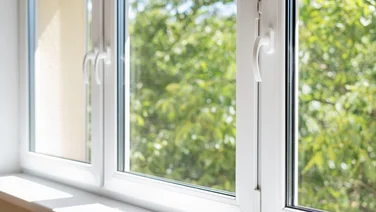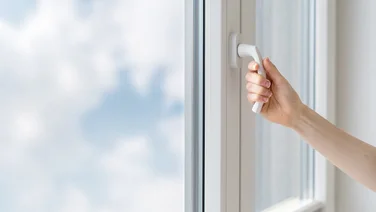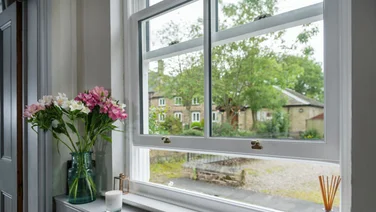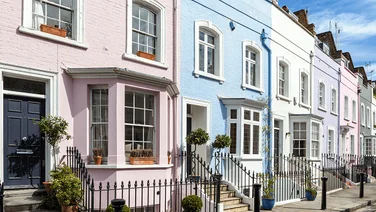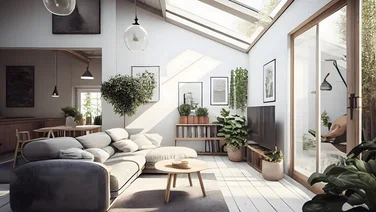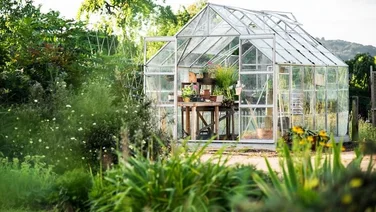We receive a small fee from trusted installers when you request a quote through our site. This helps us keep our content independent, well-researched and up to date – Learn more
- How much does double-glazing cost in 2025?
- How much does uPVC double-glazing cost in the UK?
- Why should I get double-glazing?
- How much money can I save with double-glazing?
- Are there any grants for double-glazing in the UK?
- Should I use a local or a national installer?
- What do I need to think about before buying double-glazing?
- How expensive is it to maintain double-glazed windows?
- Should I just replace my window panes or install new double-glazed windows?
- How do I start double-glazing my house?
- Summary
- Double-glazing can save the average household up to £140 a year
- Double-glazing costs £1,000 per window on average
- There are several grants in the UK for energy-efficient home improvements

Double-glazed windows can be expensive, costing upwards of £10,000-£15,000 for the average home. It’s well worth it, though, since your new double-glazed windows will make your home warmer, quieter, and more secure.
Double glazing can save the average household up to £140 a year on their heating bills, according to the Energy Saving Trust, so you’ll make back some of the money you’ve spent.
In this article, we’ll break down double glazing costs by house size, window material, and design so you can make an informed decision on what option is best for you.
If you want to compare prices from different installers, we can help. Just fill in our form, and we’ll pass your details to our trusted double-glazing suppliers. They’ll reach out to you with free quotes for you to compare.
How much does double-glazing cost in 2025?
The cost of double-glazing can vary by a lot depending on how many windows you’re installing, the style of windows, the materials they’re made of, and the installer you choose.
| Window style | Average cost (not including installation) |
|---|---|
Casement | £500-£1,250 |
Tilt and turn | £600 – £1,400 |
Sash | £700 – £1,500 |
Bay windows (three sections) | £1,100 – £4,000 |
Prices are average from various window suppliers and ballpark figures. Last updated January 2025.
Use our double-glazing cost calculator to check how much you will likely pay for your new windows.
You can also take a look at this table to see the cost of double-glazing based on house size. These figures don’t including installation, which costs around £250 per day.
Property size | Number of windows | Window frame material | Average cost |
|---|---|---|---|
Flat | 4 | uPVC | £4,000 |
Flat | 4 | Wood | Add about 50% to uPVC cost |
Flat | 4 | Aluminium | Add about 25% to uPVC cost |
Bungalow | 8 | uPVC | £8,000 |
Bungalow | 8 | Wood | Add about 50% to uPVC cost |
Bungalow | 8 | Aluminium | Add about 25% to uPVC cost |
Mid-terrace | 12 | uPVC | £12,000 |
Mid-terrace | 12 | Wood | Add about 50% to uPVC cost |
Mid-terrace | 12 | Aluminium | Add about 25% to uPVC cost |
Semi-detatched | 16 | uPVC | £16,000 |
Semi-detatched | 16 | Wood | Add about 50% to uPVC cost |
Semi-detatched | 16 | Aluminium | Add about 25% to uPVC cost |
Detatched | 20 | uPVC | £20,000 |
Detatched | 20 | Wood | Add about 50% to uPVC cost |
Detatched | 20 | Aluminium | Add about 25% to uPVC cost |
Last updated January 2025, costs courtesy of suppliers such as Everest.
You should expect to pay an extra amount of between 10% and 20% of the cost to add a colour finish.
How much does uPVC double-glazing cost in the UK?
Here’s the price range you can expect for uPVC double-glazing based on which window style you choose:
uPVC window style | Cost |
|---|---|
Casement | £600-£1,800 |
Tilt and turn | Circa 25% more than casement |
Sash | Circa 50% more than casement |
Bay | Circa 150% more than casement |
Last updated January 2025, costs courtesy of suppliers such as Everest.
uPVC windows are the cheapest option for double-glazing.
If the upper price range seems outrageously high, don’t worry, it’s largely based on window size. It’s unlikely you’ll pay this much per window, unless all the windows in your home are gigantic.
Prices for double-glazed doors start as low as £300 for a 90 x 210cm front door with double-glazed glass, but can get as expensive as £550 when you include the installation cost.
The average overall cost for a double-glazed front door is £700.
Sliding French doors with double glazing carry a heftier price tag. You can expect to pay an average of £1,200 for this type of design, though prices can go as high as £2,000 – so make sure to decide beforehand how much you want to spend.
If you’re looking for installers near you, have a look at our page that looks into the best double glazing companies.
You can technically install double glazing yourself – but it’s not recommended. Even if by doing it yourself you’ll save money on labor cost, it could lead to inefficient windows, more expense in the long run, and possibly an injury.
Why should I get double-glazing?
- Insulation
Double-glazing can reduce heat loss by 30% and 50% compared to single-glazed windows. The exact amount depends on the design, frame material, insulation quality, size, and number, but they are more energy efficient as they lower energy bills and use costly central heating.
- Noise reduction
Having multiple panes of glass and an air gap in the middle, double-glazing absorbs sound vibrations and filters out up to twice as much noise pollution as single-pane windows.
- Increased security
Double-glazing makes it harder to break a window, especially with toughened glass, and can provide peace of mind with an extra layer of protection.
- Condensation prevention
Double-glazed windows have two panels, the interior of which should remain at the same temperature as the air inside the building. This prevents condensation from forming and is much less likely to cause dampness and mold.
What’s the best way to deal with condensation inside double glazing? Read our dedicated guide to find out.
How much does aluminium double-glazing cost in the UK?
Here’s how much aluminium double-glazing costs based on which window style you choose:
Aluminium window style | Cost |
|---|---|
Casement | £750-£2,250 |
Tilt and turn | £938-£2,813 |
Sash | £1,350-£4,050 |
Bay | £3,750-£11,250 |
Last updated January 2025, costs courtesy of suppliers such as Everest.
Windows with aluminium frames are around 25% more expensive than ones with uPVC frames. As before, the higher price ranges reflect how much you’d pay for very large windows.
How much does wood double glazing cost in the UK?
The cost of wood double glazing also varies depending on the style of window you choose. Here are the price ranges you can expect:
Wood window style | Cost |
|---|---|
Casement | £900-£2,700 |
Tilt and turn | £1,125-£3,375 |
Sash | £1,350-£4,050 |
Bay | £2,250-£6,750 |
Last updated January 2025, costs courtesy of suppliers such as Everest.
Wood is the most expensive frame material for windows, but a wooden windows’ lifespan also tends to be longer than windows with other frame materials, if you take care of them well.
How much money can I save with double-glazing?
You can save roughly £140 a year on heating bills by installing A- rated double glazing windows in an entirely single-glazed semi-detached property, according to the Energy Saving Trust.
Want to go a step further? You could try installing A++ rated double glazed windows, which will typically lead to savings of about £150 a year.
After 20 years, the average UK home with A- rated double glazing will save around £2,800 on their energy bills, compared to if they’d kept their single glazing.
Here’s how much you could save with A- and A++ double glazing:
Window efficiency rating | Energy bill savings after a year | Energy bill savings after 20 years |
|---|---|---|
A- double glazing | £140 | £2,800 |
A++ double glazing | £150 | £3,000 |
Last updated January 2025.
We’ve created a double glazing savings calculator, where you can find out how much typical households of different sizes are likely to save on energy bills.
Though of course, this doesn’t measure the lovely comfort of having a warmer home.
What type of double glazing do you need?
Get started
Are there any grants for double-glazing in the UK?
There are several grants in the UK for energy efficient home improvements, which cover double-glazing. These include the ECO4 scheme, the Home Upgrade Grant (discontinued as of March 2025), the Warm Homes Local Grant, and the Home Energy Scotland Loan. They can help with up to 100% of the cost of double glazing but you have to meet certain eligibility.
If you’re interested in double-glazing grants for over-60s, have a look at our guide.
Should I use a local or a national installer?
Local and national installers both have their pros and cons. On the one hand, local installers are likely to provide a cheaper deal, whereas national companies are more likely to be trusted by users because they’re more well known.
You can learn more about local and national double-glazing companies, which one will be better for you, and how we rate them by visiting our Best Double Glazing Companies page.
The following authorities play an important role when it comes to ensuring high standards in the double-glazing industry:
- Fenestration Self-Assessment Scheme (FENSA): Members who are registered with FENSA are compliant with up to date thermal performance standards, which means that the double-glazing they install meets the necessary energy-efficiency standards
- Double Glazing & Conservatory Ombudsman Scheme (DGCOS): Monitors UK double-glazing installers to make sure they meet appropriate quality and service levels. This means that those using a DGCOS-registered company are able to benefit from increased protection
- Certass: This government-backed agency operates on a not-for-profit basis, and aims to increase consumer confidence through the evaluation of registered contractors
- TrustMark: TrustMark endorses companies in a variety of trades and industries as long as they meet government-approved guidelines and standards
What do I need to think about before buying double-glazing?
Before buying double-glazing, it’s a good idea to think about what materials and designs you want, as well as any other factors that might affect the cost. Here’s what you should consider:
- Window style – Some window styles, such as sash windows, have complex opening mechanisms, which increases their cost
- Frame material – Some materials, such as wood timber, are more expensive to manufacture than others, adding to the overall cost of the window
- Type of glass – Glass rated A++ for its high insulating qualities is more expensive than glass with a lower rating, such as B or A. Coloured, grainy, or obscure glass, will all be more expensive than standard glass
- Window size – The larger a window is, the more material it uses. More material equals a higher cost
- Extra finishes – Window locks, additional window openings, or ornate window handles will all add the the overall cost, as these personalised designs require extra manufacturing
How expensive is it to maintain double-glazed windows?
Double-glazed windows are not very expensive to maintain. The main thing you need to do is keep them clean. Here’s what you can expect to pay for different services:
- Window cleaning: £40 to £150, depending on your area and the size of your home. Only needs to be done twice a year
- Getting rid of condensation: £20-£70 to refill a gap in the sealant, the most common cause of condensation on double glazing
- Small repairs: £80-£150 to fix issues such as broken hinges or panes
Should I just replace my window panes or install new double-glazed windows?
Replacing the pane in a double-glazed window cost £250, according to CheckaTrade, much cheaper than the £1,200 it costs for a completely new window.
While it’s a tempting option, replacing the glass in your double glazed windows isn’t always a good idea.
If your windows have a misting issue, it sometimes means moisture has seeped into the gap between the panes of glass – in this circumstance, glass replacement is the right thing to do.
However, if there’s an issue with the frame, glass replacement will just be a waste of time and money – you’ll have to replace the whole unit.
Want to find out about more cheap double-glazing options? Check out our page, Second-Hand Double Glazed Windows: Are They Worth It?
How do I start double-glazing my house?
- Shop around and get multiple quotes
- If you get a company to measure your windows and give you a quote at home, hear them out – but don’t sign a contract on the spot
- Hire a professional to install your new double-glazed windows
- Get a locally based company for the installation, as its workers won’t have to spend as much time travelling to and from the job, and therefore won’t have to charge you extra
- Check you don’t live in a conservation area or listed building
- Decide ahead of time how much you and your loved ones want to spend on the new windows
- Check the U-value of a window before buying it – it should ideally be around 0.6 or lower
- Fill in your details for free quotes and get moving towards your double-glazed future.
Summary
- Double-glazing offers long-term savings and increased comfort, making it a worthwhile investment for any homeowner.
- Compare quotes from trusted installers to find the best double-glazing option for your home and budget.
- Use our tools to estimate costs, savings, and the best materials for your double-glazing project.
- Take advantage of grants and energy-saving incentives to reduce the cost of double-glazing installation.
- Begin your double-glazing journey today for a warmer, quieter, and more energy-efficient home.


